- Home
- Gore Vidal
Lincoln Page 4
Lincoln Read online
Page 4
Lincoln’s response was sharp. “Certainly, not the man best qualified. I think that is already understood, isn’t it?” For all Lincoln’s serene amiability, Seward detected a sudden edge of true bitterness. As a minority president, Lincoln could only reign by placating certain great powers and dominations. As for ruling … It was Seward’s view, on the morning of Saturday, February 23, 1861, that Lincoln would be fortunate if he could last out his term as the figurehead president of a mere rump of the dis-United States. Since the wealth and talent of this remaining fragment of the original Union was almost entirely in the north—specifically, in New York and New England—the inexperienced outlander from the west would need a knowledgeable prime minister, a man from the wealthy part—himself, the party’s leader. But Seward was in no hurry to impose himself and the so-called Albany Plan upon Lincoln. He was convinced that in the next nine days tumultuous events would make him so necessary to the new president that he would then be able to assert his dominance in order to avoid the war with the South that Lincoln might blunder into, exclude Chase and the Democrats from the Cabinet, and begin the creation of the new North American—South American and West Indian, too; why not?—empire that Seward felt would more than compensate them for the loss of the slave states.
Seward was no longer the abolitionist he had once been. He was now both more and less ambitious than when, in the very year that Lincoln was attacking Polk for making war on Mexico, he was telling an audience in Cleveland that, “slavery must be abolished and you and I must do it.” Now Seward was conciliatory on the matter in general; and beautifully vague in particular. On the other hand, Lincoln was still struggling with the words that he had so proudly hurled in the face of President Polk: “Any people anywhere,” Representative Lincoln had proclaimed to the Congress, “being inclined and having the power, have the right to rise up and shake off the existing government …” Seward knew this so-called right of revolution speech by heart, as did every Southerner; and not a day passed that these words were not used to taunt the tall, awkward-moving man who was entering the War Department for the first time.
At seventy-four, Winfield Scott was general-in-chief of the Union armies and at six feet four and a quarter inches, he was a quarter-inch taller than the new president. Estimates of his legendary weight seldom dropped below the three-hundred-pound mark.
General Scott received the Commander-in-Chief-elect in his ground-floor office—he was too large and too old to climb stairs with any ease. Although he suffered from gout, he still loved food and wine; loved glory and himself. The bejowled, red face was huge and mottled; a spider’s web of tiny purple lines had netted the nose. Scott wore an elaborate uniform of his own design, gleaming with gold braid and massive epaulets. Like a glittering mountain he stood now before a painting of himself as the hero of the War of 1812. As Lincoln entered the room, the general waddled forward; they shook hands beneath a painting of Scott conquering Mexico in 1847.
“You have come, sir, when, as a nation, we are at the razor’s edge.” The old man’s voice was still deep; but there was a tendency to quaver whenever he summoned up emotion, either real or simulated.
“It’s a great privilege to meet you, General.” Lincoln glanced at the painting of Scott storming Chapultepec—and looked away. Not an auspicious beginning, thought Seward. Lincoln had detested the Mexican War.
“Sit down, sir.” Scott eased himself into a throne that had been designed for a very fat man to get in and out of with relative ease. “I must confess, sir, I did not vote for you—”
“Because you are a Virginian?”
“No, sir. I am a loyal Union man, which is why I am so relieved that you are here to prevent more dis-Union. I did not vote for you because I never vote.”
“Well, General, I voted for you in 1852, when you were the last Whig candidate for president, and I was just about the last good Whig in Springfield.” Seward wondered whether or not this was true. In the course of the morning, he had duly noted that Lincoln had the gift of flattery, a form of insincerity that Seward tended to think of as being peculiarly his own most delicate art. In any case, Seward regarded Scott as his own handiwork. After all, it had been Seward’s idea to run the man for President; and Seward had written every single speech that Scott had delivered in the course of a disastrous campaign.
“I received,” said the general, the voice of military command taking on a politician’s tone, “one million three hundred eighty-six thousand five hundred and seventy-eight votes. Franklin Pierce”—as the old man said the name, the red face darkened—“got two hundred twenty thousand more votes than I. And now we are faced with a civil war. Because, sir, had I been elected, I would have strengthened the Federal forts in the south. There would have been no trouble at Fort Sumter because I would have made nearby Fort Moultrie impregnable, and Charleston would still be what it is meant to be—a harbor of the United States.”
“What is to be done?” Lincoln’s voice was soft.
Scott motioned to an aide, who set up a map of the Union on an easel. Scott then picked up a ferule that lay beside his throne and pointed to the various military establishments throughout the South. He presented the bad news directly. With the exception of Forts Sumter and Pickens, the rest of the Federal forts either were in rebel hands—or would soon be. Seward then expected Scott to follow their agreed-upon line: Lincoln should say to the South, “Wayward sisters, go in peace.” Although Scott said no such thing, he was hardly sanguine. “We have no fleet to speak of. This Administration has deliberately weakened our military forces. But then Mr. Floyd, the late Secretary of War, is a secessionist and a traitor. You do not object to my candor, sir?”
“No, General. I had come to the same conclusion myself. Now if war were to come …” Lincoln paused. Seward sat on the edge of his chair. It had never occurred to him that Lincoln might actually have a plan and that that plan might involve a military action against the rebel states. Like most intelligent men, Seward thought that all intelligent men, given the same set of facts, would react as he did. During the last few hours, he had come to appreciate Lincoln’s intelligence if not the rustic western style; now this sallow-faced man, sprawled in an armchair, knees working their way to his chin, was saying, “If war were to come, how long would it take us to raise an army, build a fleet, make all necessary preparations?”
“Six months, sir. What we lack now are good officers. The best of our West Pointers are Southerners. From Jefferson Davis himself, the President of the Confederacy, to—”
Lincoln cut the old man short. “General, that is a title that I do not use nor acknowledge, while the Confederacy is a place that does not exist. Is that clear?”
Seward sat bolt upright. This man Lincoln was hard, all right; or so he sounded. Intelligent men were pliant; or so Seward chose to believe.
“Yes, sir. You are right, sir. Anyway, from Mr. Davis to Colonel Lee, all our best officers are Southern.”
“Maybe you should’ve promoted a few more Northerners—and Westerners.”
“Well, sir …” Vaguely, Scott gestured with his ferule, which in turn reminded him of the map. “Sir, I have already devised a plan, should it be necessary to restore the Union by force.” Scott paused for some response from Lincoln but there was none beyond attentiveness.
Scott continued without, as it were, the looked-for sign. “If Virginia and Maryland go out of the Union, we shall then be obliged to move the capital to Harrisburg or to Philadelphia …” Scott paused. Lincoln made no response; the face was impassive. Seward was growing definitely uneasy. What was this man’s game? Seward, who enjoyed poker, rather thought that Lincoln was simply indulging himself in the card-player’s bluff. Certainly, he hoped that that was what it was.
Scott, signless again, proceeded to divide the South with his stick. “I do not think that a straight assault on Maryland and Virginia will succeed. Virginia is the most populous of the Southern states, the wealthiest, the most ready for war. We should inflict w
hat damage we can upon Virginia but I would say, sir, that our hope is in the west. The Mississippi River is the key. Seize the river. Knock Mississippi out of the war and whatever sections of Tennessee and Kentucky may stand against us. Split the South into two parts, and each part will die for lack of the other.”
Scott paused. Lincoln slowly straightened up. “Well, I guess we’d better persuade Virginia and Maryland to stay in the Union a while longer.” Seward gave an audible sigh of relief. This was the Lincoln that he had been inventing for himself ever since the election: the cautious vacillator—a Western Jesuit, in fact.
As Lincoln rose, an aide pulled Scott to his feet. “By the way, General, what would you do about Fort Sumter?”
“I would hold out as long as possible.”
“And then?”
“I would evacuate the fort. Otherwise, Major Anderson and all his men will be killed or seized. We have not the sea power to dominate Charleston harbor.”
“An honor to meet you, General.” Lincoln turned to Seward. “My wife and family should be arriving any minute now.”
“Well, the mayor will be at the depot, even if you won’t be.”
Lincoln frowned. “I should have stayed with the rest of the party.”
“It was at my advice, sir,” said Scott, “that you took the night-cars. I trust our people in Baltimore. They swore to me that you would never have got through alive.”
“Well, even if you were right, General, I’m still not sure that you’ve done me a good turn.”
“We could take no chances,” said Seward.
General Scott nodded. “That’s why I agreed with Mr. Seward when he said you would be safer at Willard’s Hotel than in a private house.”
“Was that your idea?” Lincoln looked at Seward, with some amusement. “I thought it was General Scott’s.”
Seward was amazed to find himself blushing, as he stammered about safety. Actually, the Albany Plan had dictated Lincoln’s removal from a private house to a hotel where Seward and the others would have access to him and his party. The general saluted as they departed.
The weak sun had now vanished behind what looked to be snow clouds. Lincoln and Seward walked in silence down Seventeenth Street to the corner of Pennsylvania Avenue, as usual crowded at this time of day. Carriages and cabs clattered by while the horse carriages rattled on their tracks, bells sounding.
“No soldiers,” said Lincoln, watching the traffic.
“No war—so far.”
“What a fix we’re in,” said the President-elect, stepping up on the brick sidewalk that led past the iron fence of the White House, where he would soon be quartered—caged, was more like it, thought Seward. For a brief moment—very brief, actually—he was glad that Lincoln and not he had been elected sixteenth president of what was left of the United States of America.
FOUR
THE SIDEWALK in front of Willard’s Hotel seemed to hum and throb, and John Hay felt as if he were still on the cars as he made his way through the crowd of people—mostly colored, he noticed—who were on hand to get a look at Mr. Lincoln, who was not visible; unlike Mrs. Lincoln, who was, as well as the three Lincoln sons, the six lady relations of Mrs. Lincoln’s, the two Lincoln secretaries John George Nicolay (born twenty-nine years ago in Bavaria; moved to Illinois as a child; grew up to edit a Pittsfield newspaper) and John Hay himself, aged twenty-two, a graduate of Brown who had been admitted to the Illinois bar exactly two weeks ago, thanks, in part, to the fact that his uncle was Springfield’s leading lawyer and an old associate of Lincoln; thanks, again in part, to the fact that Hay had gone to school with Nicolay, Lincoln’s secretary during the campaign for the presidency. Hay had been able to make himself so useful to Nicolay in the campaign that Nico had said to the President-elect, “Can’t we take Johnny to Washington with us?” and although Lincoln had groaned and said, “We can’t take all Illinois down with us to Washington,” John Hay had been duly employed as a presidential secretary. Small, wiry, handsome, John Hay intended to enjoy as much as possible his sudden elevation in the world.
At Brown, Hay had wanted to be a poet; in fact, he was a poet who wrote verse that got published. But that was not exactly a career or a living. For a time, the pulpit had appealed to him—except for the business about God. Although the law had no great appeal to him, for a young man named Hay there was not much choice. He worked in his uncle’s office, where he got to know his uncle’s friend, Mr. Lincoln, a man whose ups-and-downs were much talked of in Springfield, particularly the downs. Mr. Lincoln was supposed to have gone mad for two weeks just before what was to have been his wedding day, which had to be postponed. He had gone into a decline after losing his seat in Congress and despite the campaigning that he had done for the new Whig President, Zachary Taylor, he was offered no government appointment other than the secretaryship of the Oregon territory, which Mrs. Lincoln had turned down for him. Home in Springfield, Lincoln practised law with the brilliant, hard-drinking William Herndon and let himself, many said, sink into apathy, while making a good deal of money as a railroad lawyer. When the great debate on slavery began, Mr. Lincoln found his voice, and after his challenge to Stephen Douglas, he had come to personify the new Republican Party and the new politics—whatever they were. Hay was never quite certain just where Mr. Lincoln meant to take the nation but he did know that wherever that was, he was going to go, too.
At the center of the lobby, the manager of Willard’s was greeting Mrs. Lincoln, who was tired and not, Hay could see, in the best of moods. Nicolay and Hay had their code words for the great folk. Mary Todd Lincoln was known, depending on her mood, as either Madam or the Hellcat. Mr. Lincoln was either the Ancient or, in honor of the previous year’s visit to Washington by the first ambassadors from that awesome Japanese official known as the Tycoon, the Tycoon.
The slender Nicolay was at the Hellcat’s side, smiling grimly through his long, pointed, youthful beard. Although Hay could not hear what the Hellcat was saying, he suspected that a complaint was being duly registered. Suddenly, Hay found himself next to the oldest Lincoln son, Robert, a seventeen-year-old Harvard freshman who said, with pleasure, “Johnny!” as if they had not spent the last twelve days and nights cooped up together on the cars from Springfield, playing cards in the baggage car and, occasionally, taking a swig from a bottle that Lamon always carried, “just in case,” he’d say, shoving it into the great side pocket that contained a slingshot, a pair of brass knuckles, a hunting knife and a derringer.
“I think Nicolay needs some help,” said Hay, maneuvering himself through the crowd to Mrs. Lincoln’s side just as her normal high color was beginning to take on that dusky glow which was the first sign of a Hellcat storm.
“Mrs. Lincoln!” Hay beamed, boyishly; but then with his youthful face he had no other way of looking, to his chagrin. Strange men often addressed him as Sonny; his cheek was often patted; he knew that he must, very soon, grow a moustache, if he could. “Your trunks are already in your rooms.” This was a lie. But he knew Mrs. Lincoln’s passionate attachment to her baggage and its integrity.
“Oh, Johnny! You do relieve my mind!” Mary Todd Lincoln’s smile was, suddenly, winning and so Hay was won; she took his arm and they swept through the hotel lobby to the main staircase, as the manager and his outriders cleared a path for their considerable party.
Outside, the crowd dispersed. David and Annie were disappointed not to have seen the archfiend himself. “They say he’s got whiskers now, so as no one will know him,” said David, as they walked up Thirteenth Street.
“But once people get used to the whiskers, they’ll know him after a while.” Annie stopped in front of a raw-wood picket fence. Through the gap between two slats they could see a vacant lot where a number of young men were drilling with old rifles.
“Who are they?” asked David.
“The National Volunteers,” Annie whispered, her breath white between them. “One of them is a friend of Brother Isaac.”
�
�What are they drilling for?”
“Inauguration Day. Come on. Let’s go. I don’t want them to see me.”
David and Annie hurried down the street. “They’re crazy,” he said, “to take on the whole U. S. Army.”
In Parlor Suite Six at Willard’s Hotel, it was agreed that the National Volunteers were indeed crazy but, potentially, dangerous: such was the intelligence already received by the suite’s principal resident, the bewhiskered Abraham Lincoln, who now sat in a huge armchair in the parlor as his two youngest sons, Willie and Tad, climbed over him, and Hay smiled sweetly at this domestic scene. He had never hated two children more than these. Tad, at seven, could not be understood due to some sort of malformation of his palate, while the ruthlessly eloquent and intelligent Willie, at ten, could be understood all too well. Willie was a tendentious explainer, who regarded Johnny Hay as a somewhat dull-witted playmate.
While the children shouted and pummelled their father, Seward and Lamon discussed with Lincoln, as best they could, arrangements for his security. Mary had withdrawn to the bedroom to greet her—Hay prayed—not-mythical luggage.
Nicolay was at the door to the parlor, looking somewhat alarmed. Then Hay saw why. Behind Nicolay towered the unmistakable figure of Charles Sumner, senator from Massachusetts, heir to Daniel Webster, greatest of the Senate’s scholars, an orator of such power that audiences had been known, after three hours of his burning-bush language, to beg for more of that incandescent flame, fuelled by a single passion—the conviction that there was no greater task on earth than to liberate the slaves, and punish their masters.
Lincoln positively jackknifed to his feet at the sight of Sumner, scattering his sons upon the flowered carpet. As the boys started to yell with indignation, Lincoln said, “John, you deliver the boys to their mother.”

 The Golden Age: A Novel
The Golden Age: A Novel Death Before Bedtime
Death Before Bedtime Burr
Burr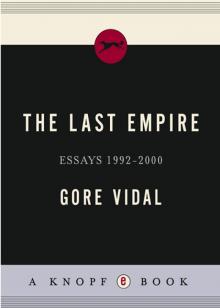 The Last Empire
The Last Empire Empire: A Novel
Empire: A Novel The Selected Essays of Gore Vidal
The Selected Essays of Gore Vidal Live From Golgotha
Live From Golgotha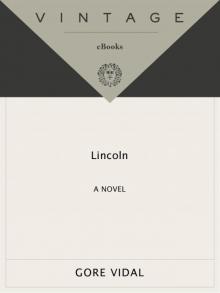 Lincoln
Lincoln Death Likes It Hot
Death Likes It Hot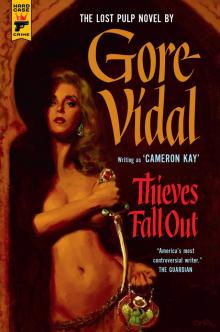 Thieves Fall Out (Hard Case Crime)
Thieves Fall Out (Hard Case Crime) Point to Point Navigation
Point to Point Navigation Williwaw
Williwaw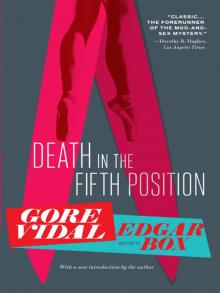 Death in the Fifth Position
Death in the Fifth Position In a Yellow Wood
In a Yellow Wood Julian
Julian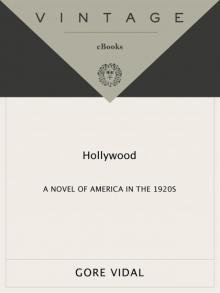 Hollywood
Hollywood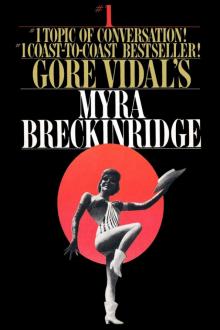 Myra Breckinridge
Myra Breckinridge Messiah
Messiah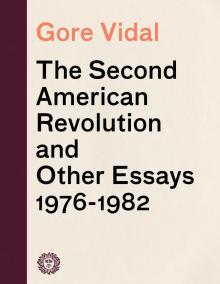 The Second American Revolution and Other Essays 1976--1982
The Second American Revolution and Other Essays 1976--1982 Homage to Daniel Shays
Homage to Daniel Shays Empire
Empire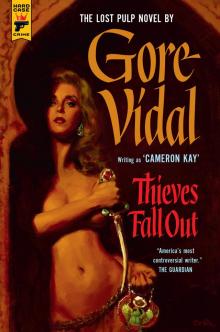 Thieves Fall Out
Thieves Fall Out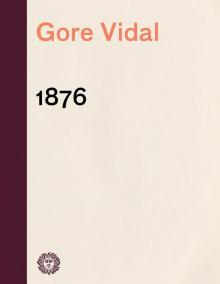 1876
1876 The City and the Pillar
The City and the Pillar The Golden Age
The Golden Age At Home
At Home